Chile Poised for Right-Wing Victory as Crime Fears Sweep Latin America

© Sara Wayra for The New York Times

© Sara Wayra for The New York Times

(德国之声中文网)当地时间周日(12月14日)傍晚,在澳大利亚邦迪海滩(Bondi Beach)举行的犹太节日活动“海边的光明节”上发生枪击事件,造成至少12人死亡、近30人受伤。澳大利亚警方和官员将此事件定性为恐怖袭击。
新南威尔士州警察总监马尔·兰扬(Mal Lanyon)在新闻发布会上表示,一名嫌疑枪手被当场击毙,另一名情况危急,正在抢救中。已有至少29人被送往医院接受治疗,其中包括两名警察。
兰扬还透露,警方正在调查是否有第三名枪手涉案,同时排爆小组正处理多枚疑似简易爆炸装置。 澳大利亚高级情报官员迈克·伯吉斯(Mike Burgess)表示,其中一名嫌疑人此前已在当局监控名单中,但并未被视为迫切威胁。

澳方召开紧急会议
此次枪击事件是自2023年10月以色列与哈马斯战争爆发以来,澳大利亚国内一系列反犹事件中最为严重的一起,之前已有犹太教堂、建筑及车辆遭到攻击。
澳大利亚一向被视为全球最安全的国家之一,大规模枪击案极为罕见。这是自1996年塔斯马尼亚州旅游景点发生35人死亡的枪击案以来,澳大利亚最严重的类似事件。
澳洲总理阿尔巴尼斯召集国家安全委员会紧急会议,并谴责此次袭击,称“这场袭击所展现的邪恶令人难以想象”。“这是一起专门针对澳大利亚犹太人的蓄意袭击,发生在光明节的第一天——原本应是一个充满喜悦与信仰的日子。”阿尔巴尼斯补充道:“在这个国家的黑暗时刻,警方和安全机构正全力追查所有与这场暴行有关的人员。”
混乱之中出英雄
有目击者称,袭击持续约10分钟,数百人在邦迪海滩和附近街道、公园中惊慌逃命。警方表示,仅光明节活动就吸引了约1000人参加。
社交平台X上传出多段视频,显示人群尖叫奔逃、警笛四起。一段视频中,一名身穿白衬衫的男子冲向一名穿深色上衣、手持步枪的男子。他从背后将对方扑倒,徒手夺下其步枪,随后将枪口反指向该男子。视频随后显示,身穿深色上衣的男子站立不稳,向后退向一座桥的方向,而桥上当时还有另一名枪手。与此同时,这名旁观者将枪放在地上。
路透社通过多段经过核实的辅助影像确认了这段视频的真实性,这些画面显示的是同一批男子。路透社还核实,视频中出现的持枪者,与其他经核实影像中被警方包围的嫌疑人是同一批人,依据是他们的服装特征一致。
这段记录路人英勇行为的视频迅速在社交媒体上传播开来,许多人称赞该男子的勇气。目前,该男子的身份尚未公布。新南威尔士州州长克里斯·明斯(Chris Minns)表示,这是他“见过最令人难以置信的场面”。他说:“一名男子走向一名刚刚向民众开枪的枪手,独自一人将其缴械,冒着生命危险,拯救了无数人的生命。”
以色列政府公开批评
恐袭事件发生后,以色列总统艾萨克·赫尔佐格(Isaac Herzog)表示,那些到海滩点燃光明节第一支蜡烛的犹太人,遭到了“卑劣恐怖分子”的袭击。
以色列外交部长吉迪恩·萨尔(Gideon Saar)对枪击事件表示震惊,并指责澳大利亚政府在多次警告后依然“未能警醒”。 他说:“这是过去两年来澳大利亚街头反犹情绪泛滥的直接后果,‘全球化起义’(Globalise the Intifada)等煽动性口号如今变成了现实。”
多国领导人表态
德国总理梅尔茨(Friedrich Merz, 又译“默茨”)称此次恐袭事件令他“震惊得无言以对”。他在社交平台 X 上发文表示:“这是对我们共同价值观的攻击。我们必须制止反犹主义——无论是在德国,还是在世界各地。”
欧盟委员会主席乌尔苏拉·冯德莱恩(Ursula von der Leyen)也表示 “对邦迪海滩的悲剧性袭击深感震惊”,“我向遇难者的家属和亲人致以诚挚慰问”。她在X平台上写道:“欧洲与澳大利亚以及全球犹太社群站在一起。我们团结一致,反对暴力、反犹主义与仇恨。”
英国首相斯塔默表示,针对悉尼犹太人聚会的致命袭击“令人作呕”,并强调:“英国将始终与澳大利亚以及犹太社群站在一起。”
法国总统马克龙谴责这起袭击,并誓言法国将“毫不懈怠地打击反犹仇恨”。
意大利总理梅洛尼在X平台上表示,她对“来自悉尼的悲惨消息深感悲痛”。她补充说:“意大利再次坚定谴责一切形式的暴力和反犹主义,并向遇难者表示哀悼。”
乌克兰总统泽连斯基在X平台上表示,乌克兰“在面对这起发生在悉尼邦迪海滩、针对犹太社区的残忍恐怖袭击时,与澳大利亚站在一起”。他强调:“恐怖与仇恨绝不能得逞——必须在任何地方、任何时候将其击败。”
美国国务卿鲁比奥表示,美国“强烈谴责”邦迪海滩发生的袭击事件。他在X平台上写道:“反犹主义在这个世界上没有立足之地。我们为这起可怕袭击的受害者、犹太社群以及澳大利亚人民祈祷。”
DW中文有Instagram!欢迎搜寻dw.chinese,看更多深入浅出的图文与影音报道。
© 2025年德国之声版权声明:本文所有内容受到著作权法保护,如无德国之声特别授权,不得擅自使用。任何不当行为都将导致追偿,并受到刑事追究。
位于云南昭通的渝昆高铁最长隧道贯通,渝昆高铁云南段进入最后冲刺阶段。全线建成通车后,重庆到昆明的行车时间将压缩至约两个半小时。
《光明日报》星期天(12月14日)第三版刊,渝昆高铁全线最长隧道——彝良隧道,于星期三(10日)安全贯通,为全线建成通车打下坚实基础。
彝良隧道位于云南省昭通市境内,全长24.8公里,设计时速350公里,最大埋深920米,采用双洞单线的设计形式。隧道穿越乌蒙山腹地,这里山高谷深,地质构造复杂多变,为一级高风险隧道,建设难度极大。
据新华社报道,彝良隧道是渝昆高铁重难点控制性工程,科研攻关团队已获得省部级工法三项、国家专利七项,申报国际专利一项,为中国长大高铁隧道施工积累了宝贵经验。
随着彝良隧道的贯通,渝昆高铁云南境内隧道贯通已达96%,53座隧道即将全部贯通。
目前,渝昆高铁云南段全面进入冲刺阶段,施工人员正全力推进无砟轨道施工和站后工程建设。
据悉,渝昆高铁全长约700公里,其中云南段长388.6公里,是云南省内首条时速350公里的高速铁路。
据此前报道,渝昆高铁的重庆段已于去年9月开通运营。
渝昆高铁全线建成通车后,重庆到昆明的行车时间将压缩至约两个半小时。报道称,这对促进成渝地区双城经济圈与滇中城市群之间互联互通,推动沿线地区经济社会高质量发展具有重要意义。

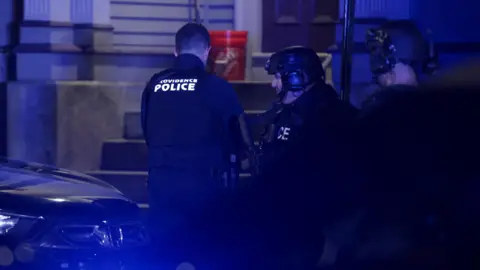 Reuters
ReutersA person of interest has been detained in connection with a US shooting at Brown University that left two people dead, police said.
Nine others were injured when a gunman opened fire at the university in Providence on Saturday.
Police confirmed on Sunday a person had been detained, and an earlier order for people on the Brown campus and surrounding areas to shelter had been lifted.
Of those injured, medics said one person was in a critical condition, six were "critical but stable" and two others were less severely hurt.
The gunman opened fire in a classroom at around 16:00 local time (21:00 GMT) on Saturday at the Holley engineering building at the eastern end of Brown's campus, according to officials.
The identities of those killed or injured have not yet been released, but Brown University President Christina Paxson told reporters in a press briefing on Saturday that all the victims, including those killed and wounded, were students.
Police had earlier released CCTV footage of a male suspect walking away from the scene wearing all black clothing. Officers said a firearm was not found in a sweep of the building.

(德国之声中文网)据美联社报道,乌克兰总统泽连斯基表示,乌克兰、美国和欧洲官员将在柏林举行一系列会晤。泽连斯基周六晚间在乌克兰发表全国讲话时表示:“最重要的是,我将与特朗普总统的特使会面,还将与我们的欧洲伙伴和众多领导人举行会晤,讨论和平的基础,以及一项结束战争的政治协议。”
据报道,美国特使威特科夫(Steve Witkoff)以及特朗普的女婿库什纳(Jared Kushner)周日已抵达柏林。
几个月来,华盛顿方面一直在努力平衡各方的要求,特朗普敦促俄罗斯尽快结束对乌克兰的战争,但同时也对战争的拖延越来越感到恼火。寻求可能的妥协方案遇到了重大障碍,包括对乌克兰东部顿涅茨克地区的控制权问题(该地区大部分被俄罗斯军队占领),以及乌克兰的安全保障问题。
泽连斯基表示:“我们正在努力确保乌克兰的和平是有尊严的,并确保——尤其重要的是——俄罗斯不会再次入侵乌克兰。”
俄罗斯总统普京要求乌克兰从其仍控制的顿涅茨克地区撤军,并放弃加入北约的计划,这是和平的关键条件之一,但基辅方面拒绝了这些要求。
俄罗斯总统外交政策问题顾问乌沙科夫(Yuri Ushakov)警告称,寻求妥协可能需要相当长的时间。他指出,原本已考虑到俄方诉求的美方提案,在乌克兰及其欧洲盟友提出修改意见后被“削弱”了。他在接受媒体采访时说:“美国人知道并理解我们的立场。”
德国总理梅尔茨本周六在慕尼黑表示,普京的目标是“从根本上改变欧洲的边界,在现有边界内恢复昔日的苏联”。他还警告说,“如果乌克兰沦陷了,他(普京)并不会就此收手”。
普京则否认有意恢复苏联或者攻击任何欧洲国家。
乌克兰方面称,过去一周,俄罗斯向乌克兰发射了超过1500架攻击型无人机、近900枚制导航空炸弹和46枚各种类型的导弹。
俄罗斯国防部称,俄罗斯防空部队在周六晚至周日凌晨击落了235架乌克兰无人机。
DW中文有Instagram!欢迎搜寻dw.chinese,看更多深入浅出的图文与影音报道。
© 2025年德国之声版权声明:本文所有内容受到著作权法保护,如无德国之声特别授权,不得擅自使用。任何不当行为都将导致追偿,并受到刑事追究。
Twelve people have died - including one gunman - following a shooting at Australia's Bondi Beach which targeted the Jewish community on the first day of Hanukkah.
According to police, at least 12 others have been injured and two officers were shot during the event, which has since been declared a terror attack by officials. The surviving gunman is in a critical condition.
More than 1,000 people were attending an event on the beach celebrating Hanukkah.
Chris Minns, the premier of New South Wales, said: "Our heart bleeds for Australia's Jewish community tonight.
"I can only imagine the pain that they're feeling right now to see their loved ones killed as they celebrate this ancient holiday".
Mass shootings in Australia are very rare, and the attack at Bondi is the deadliest incident in Australia since the Port Arthur massacre in 1996.
Here's what we know so far:
Bondi Beach is located in eastern Sydney in the state of New South Wales, on Australia's east coast.
It is one of Australia's most popular beaches, attracting millions of visitors each year. The area is a significant attraction for tourists.

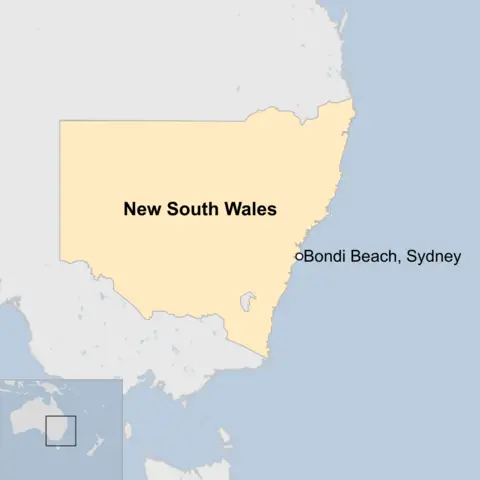
New South Wales (NSW) police responded to reports of gunfire at around 18:47 local time (07:47 GMT), with video showing hundreds of people fleeing from the coastline.
In their initial statement posted on X, NSW Police urged people at the scene to take shelter and other members of the public to avoid the area.
Around the same time, local media began reporting people "on the ground" in the vicinity of Campbell Parade.
A video verified by the BBC appears to shows two gunmen firing from a small bridge which crosses from the car park on Campbell Parade towards the beach itself.
An event to mark the first day of the Jewish celebration Hanukkah was taking place on Bondi Beach, very close to the bridge where the men were firing from. More than 1,000 were in attendance.
Premier Minns also paid tribute to a man filmed wrestling a gun from one of the attackers.
"That man is a genuine hero, and I've got no doubt there are many, many people alive tonight as a result of his bravery," Minns said at a press conference.
In the video, the man is seen sneaking up on the attacker, before grabbing him in a bear hug.
The now-disarmed man then retreats back towards the bridge, where the other attacker is still firing from.
As the video continues, another man appears to be injured and flees the scene, as a policeman arrives behind the attackers and opens fire at them.
A separate video, also verified, shows several policemen on the same bridge. One appears to be administering CPR to a motionless man as someone shouts "he's dead, he's dead".

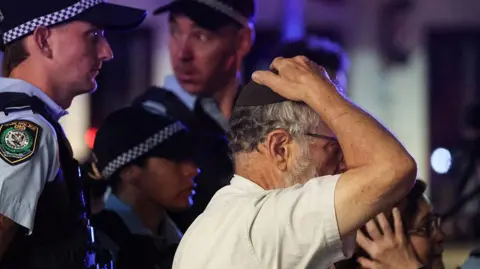 Getty Images
Getty ImagesApart from police confirming one gunman as dead, details on who has been killed and injured are sparse.
Twelve people including one of the armed men have been confirmed dead by police. Another gunman is said to be in a critical condition.
Officials say 29 other people were taken to hospital, and two officers were also shot during the incident.
One eyewitness, Barry, was attending the Hanukkah event on Bondi when with his children when he heard gunshots.
He told the BBC he saw two men on a bridge shooting towards the crowd.
He said there were bodies on the ground. He and his children were able to escape with a friend in a car, he added.

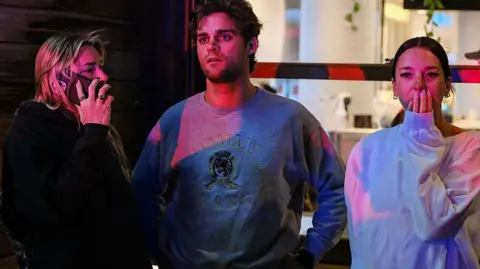 Getty Images
Getty ImagesPolice have declared Saturday's shooting a terror attack.
An exclusion zone has been set up around the scene as police use specialist equipment to check improvised explosive devices (IEDs) found in a car linked to the dead gunman, and police are still urging the public to avoid the area."
"No stone will be left unturned" in the investigation, New South Wales Police Commissioner Mal Lanyon said.
He said police would not release any information about the gunmen at this time, and urged for calm while police carry out their duties, adding that this was "not a time for retribution".
Police said they cannot confirm if there was a third gunman involved or if there was anyone else involved in the attack, but enquires are ongoing.
During a televised address, Australian Prime Minister Anthony Albanese called the Bondi Beach shooting "an act of evil antisemitism, terrorism that has struck the heart of our nation".
"We have seen Australians today run towards dangers in order to help others. These Australians are heroes and their bravery has saved lives", he added.

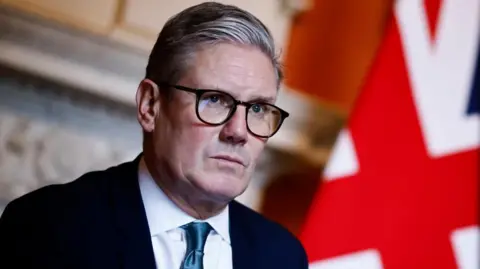 PA Media
PA MediaThe attack targeting the Jewish community at a Hanukkah event in Australia is "sickening", Sir Keir Starmer has said.
At least 11 people were killed in the shooting at Bondi Beach on Sunday and a further 29 taken to hospital, according to police.
In a statement on X, the UK prime minister said: "The United Kingdom will always stand with Australia and the Jewish community." He added that the government was working with Community Security Trust, a Jewish security organisation, on the policing of Hanukkah events in the UK.
The Metropolitan Police said it was increasing its "police presence, carrying out additional community patrols and engaging with the Jewish community to understand what more we can do".
"It is an awful reality that Jewish communities across the world continue to face a higher level of threat," the force said in a statement.
"At a time when London's Jewish communities are coming together to begin the celebration of Hanukkah, we know this attack will be the cause of not just terrible upset but also significant heightened concern about safety."
In October, two people were killed in an attack at a synagogue in Manchester on Yom Kippur, the holiest day in the Jewish religious calendar.
On Sunday, the UK's Jewish Leadership Council (JLC) called on the police and government to protect events celebrating Hanukkah which begins this evening and lasts for eight days.
Hanukkah, also known as Chanukah, is a festival of light usually observed in December.
"We are devastated and angered that in Sydney, Jews appear to have been targeted once again for being Jewish," the JLC said in a statement.
"We know that such hatred also exists in this country, as we are still reeling from the attack on a synagogue in Manchester on Yom Kippur.
"As we prepare to celebrate Chanukah over the next eight nights, we call on government and law enforcement to work with our community to protect Jewish life in the UK and ensure that events this week can go ahead safely. We must not let hatred extinguish the festival of light."

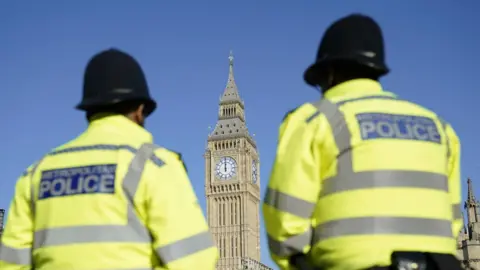 Andrew Matthews/PA Wire
Andrew Matthews/PA WireSpecialist rape and sexual offence investigation teams will be introduced to every police force in England and Wales by 2029, the government has pledged.
It is part of a long-delayed plan aimed at halving violence against women and girls within a decade.
The strategy - which will include funding for undercover units operating online, and a roll out of domestic abuse protection orders - is due to be unveiled on Thursday, after being pushed back three times this year.
Home Secretary Shabana Mahmood said the measures will help to "bear down on abusers, stopping them in their tracks. Rapists, sex offenders and abusers will have nowhere to hide."
The government says the new teams will have officers with specialist investigation skills for working on rape and sexual offence cases.
More than 50% of police forces already have these teams in place, but the government says every force will have dedicated officers by 2029.
It says staff will have the right training to understand the mindset of abusers and victims.
Announcing the move, the home secretary said: "This government has declared violence against women and girls a national emergency.
"For too long, these crimes have been considered a fact of life. That's not good enough. We will halve it in a decade."
Also announced is a roll out of domestic abuse protection orders, which have been trialled over the last year, across England and Wales.
They can ban individuals from contacting a victim, visiting their home or posting harmful content online, and can also be used in cases involving coercive or controlling behaviour. Breaching an order is a criminal offence.
There will also be almost £2m in investment for special undercover units of police officers operating online - to target those harassing women and girls on the internet.
A report released earlier this month found that more than a quarter of police forces in England and Wales had not implemented basic policies for investigating sexual offences.
It said sexually-motivated crimes against women in public remained widespread, criticised the limited nature of data on them, and called for urgent action to prevent predators from offending.
The publishing of the government's strategy has been long delayed. It was initially expected to be announced in the spring.
In Labour's general election manifesto last year the party pledged to use "every government tool available to target perpetrators and address the root causes of abuse and violence".
On Tuesday, the chairs of three Commons select committees raised their concerns over repeated delays in publishing the plans.
The BBC has previously been told that changing attitudes among boys and young men will be at the centre of what is proposed.
It is understood it will be built around three goals: preventing radicalisation of young men, stopping abusers, and supporting victims.
Some domestic abuse survivors have told the BBC the time for talking is over - and these measures must be implemented quickly.

 Reuters
ReutersA person of interest has been detained in connection with a US shooting at Brown University that left two people dead, police said.
Nine others were injured when a gunman opened fire at the university in Providence on Saturday.
Police confirmed on Sunday a person had been detained, and an earlier order for people on the Brown campus and surrounding areas to shelter had been lifted.
Of those injured, medics said one person was in a critical condition, six were "critical but stable" and two others were less severely hurt.
The gunman opened fire in a classroom at around 16:00 local time (21:00 GMT) on Saturday at the Holley engineering building at the eastern end of Brown's campus, according to officials.
The identities of those killed or injured have not yet been released, but Brown University President Christina Paxson told reporters in a press briefing on Saturday that all the victims, including those killed and wounded, were students.
Police had earlier released CCTV footage of a male suspect walking away from the scene wearing all black clothing. Officers said a firearm was not found in a sweep of the building.

 BAS/Martin Allen
BAS/Martin AllenA shiny new red post box has been given as a gift from King Charles III to staff at a remote Antarctic research station.
The Royal Mail red lamp post box was sent to staff at the Cambridge-based British Antarctic Survey station at Rothera.
The box, featuring the King Charles III cypher, was delivered after Kirsten Shaw, a station support assistant who runs the British Antarctic Territory Post Office for staff, requested an upgrade to their handmade box.
"Being in Antarctica is incredible, but it's full of extremes, so I think it's a special thing to send post back home, to communicate your experiences. It's a moment of your life that you put down on paper and give to someone else," she said.
The Rothera research station, which opened in 1975, is the largest British Antarctic Survey (BAS) facility, and a renowned global hub for climatic research.
It is situated 1,860km (1,155 miles) south of the Falkland Islands.
Staff work and live at the station for months at a time.
Ms Shaw said: "Getting post is really special for the team at Rothera.
"If you're doing fieldwork for many months, the feeling of receiving a letter — an actual tangible, piece of paper with handwriting from friends and family — is such a lift.
"It's a wonderful way to connect people that goes beyond what an email or text message can do."

 BAS/Jake Martin
BAS/Jake MartinThe box will replace the handmade and painted one currently used at the station.
The BAS said "the Royal Household worked with Royal Mail to arrange this particularly special delivery".
It was delivered to Rothera by the UK's polar research vessel RRS Sir David Attenborough, along with the first major drop of supplies to the station following the long Antarctic winter.
The post box will be installed in the Discovery Building, a new scientific support and operations hub.

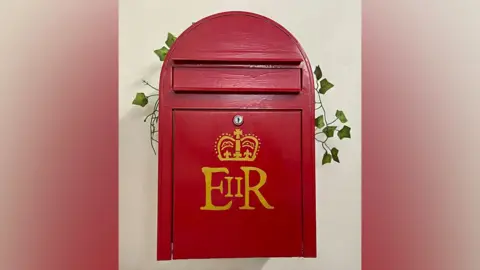 BAS/Aurelia Reichardt
BAS/Aurelia ReichardtPostal logistics in such a remote area are understandably not straightforward.
Ms Shaw's job is to oversee the formal Post Office logistics of getting mail in and out of Antarctica from Rothera, as well as getting post out to staff to other BAS stations and science field camps.
Post has to be gathered and put on board the RRS Sir David Attenborough or on BAS aircraft to the Falkland Islands, where BAS maintains an office in Stanley.
The final leg involves transport to RAF Brize Norton in Oxfordshire, where letters enter the Royal Mail postal network for onward delivery.

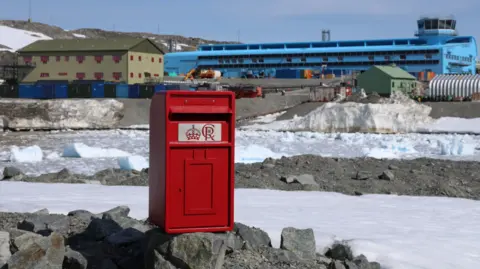 BAS/Jake Martin
BAS/Jake MartinJane Rumble, HM Commissioner for the British Antarctic Territory said: "Maintaining a postal service in the British Antarctic Territory is far more than a symbolic gesture.
"It reinforces Britain's presence and heritage in Antarctica and provides a vital link to the wider world."
Follow Cambridgeshire news on BBC Sounds, Facebook, Instagram and X.

© Matthew Abbott for The New York Times
中国甘肃永靖发生山体滑坡,一村庄45户房屋被掩埋,所幸村民及时发现险情并发出预警,农户们提早疏散,目前未造成人员伤亡。
央视新闻报道,星期三(12月10日)上午11时20分,甘肃省临夏州永靖县盐锅峡镇黄茨村发生滑坡。截至星期六(13日)傍晚6时,预估滑坡体宽390米、长722米、厚24米,方量677万方,滑移距离310米,滑体已趋于稳定。
黄茨村“12·10”滑坡地质灾害应急处置工作专班称,滑坡造成45户农户住宅被掩埋,台塬下耕地240亩以及部分基础设施损毁,初步统计已造成直接经济损失约4135万元(人民币,753万新元),灾情等级为特大型。所幸因险情发现、预警及时,群众及时转移,未造成人员伤亡。
红星新闻从权威信源处获悉,滑坡从星期三上午10时许开始,到下午3时许结束。有村民及时发现险情后,在村民群中预警,村干部随即挨户上门通知疏散。
目前,45户房屋倒塌群众以及118户避险户,已通过在酒店集中安置、投亲靠友等方式进行安置,受灾村民的生活补助也在发放中。滑坡原因仍在调查中。

法新社巴黎电稿称,包括意大利总理、法国总统和欧盟委员会主席在内的多位国际领导人周日谴责了在澳大利亚悉尼著名邦迪海滩(Bondi Beach)发生、造成11名受害者的“反犹”袭击事件。
据法新社报道,意大利总理梅洛尼在X上发文表示“深切痛苦”,写道:“意大利再次强烈谴责一切形式的暴力和反犹太主义,对遇难者表示哀悼,并与他们的亲人、伤者、犹太社区站在一起,重申对澳大利亚人民的友谊。”
法国总统马克龙在袭击宣布后不久即承诺,法国将“继续毫不软弱地打击反犹太仇恨”。
以色列总统赫尔佐格谴责这是一次“针对犹太人的残忍袭击”,同时呼吁澳大利亚加大力度打击反犹太主义。
赫尔佐格在耶路撒冷的一场活动中发表讲话时表示:“就在此刻,我们在澳大利亚悉尼的兄弟姐妹们遭到了卑鄙恐怖分子的袭击,这是一次针对前往邦迪海滩点燃光明节(Hanouka/Hanukkah)第一支蜡烛的犹太人的非常残忍的袭击。”
德国总理默茨指出他对悉尼邦迪海滩(Bondi Beach)一场犹太活动期间发生的大规模枪击事件感到“无言以对”。默茨在X上发帖说:“这是对我们共同价值观的攻击。我们必须制止这种反犹太主义——无论是在德国还是在全球。”
欧盟委员会主席冯德莱恩表示她对悉尼的袭击感到“震惊”,并谴责这是“针对犹太社区的可怕暴力行为”。
冯德莱恩在X上写道:“欧洲与澳大利亚以及世界各地的犹太社区站在一起。我们团结一致,反对暴力、反犹太主义和仇恨。”
欧盟外交事务负责人卡拉斯补充说:“这种针对犹太社区的可怕暴力行为必须受到明确谴责。”
英国首相斯塔默在X上表示,“来自澳大利亚的消息令人深感不安”。他还说:“英国向所有受邦迪海滩可怕袭击事件影响的人们致以思念和哀悼。我正持续关注事态发展。”
新南威尔士州州长克里斯·明斯(Chris Minns)证实,周日这次致命枪击袭击是针对犹太社区的。
明斯先生在新闻发布会上表示:“这次袭击的目标是悉尼的犹太社区,发生在光明节的第一天”,当时海滩上的人群正在庆祝这个犹太节日。该州警察总长马尔·兰永(Mal Lanyon)补充说,这是一次“恐怖主义行为”。

© Matthew Abbott for The New York Times

澳洲悉尼市著名景点邦迪滩发生枪击事件,截稿前据路透社最新消息已有12人遇难。据法新社早些时报道,事发当时,当地正举行犹太节日「光明节」庆祝活动,以色列总统赫尔佐格(Isaac Herzog)对此谴责,指卑鄙恐怖分子攻击参与活动的犹太人。
新南威尔士州警方在当地时间星期天(12月14日)傍晚7时之前在社交媒体平台X上发布消息称:“警方行动仍在进行中,我们继续敦促民众避开有关区域。”
警方在约两小时后说,尽管两名枪手已被制伏,公众仍需避开邦迪滩,因为有关地区仍存在炸弹威胁,他们正在拆除简易爆炸装置。
据澳洲广播公司(ABC)早些时候引述新州警方说,枪击事件造成10人死亡,包括一名枪手和9名受害者。另有12游人受伤,包括多名警员。第二名枪手也受伤,据说情况危急。
澳广播放的画面显示,两名身穿黑衣的枪手向人群开枪。《悉尼先驱晨报》报道,邦迪滩附近据称听到多达50声枪响。
澳洲总理阿尔巴尼斯称邦迪滩枪击案“令人震惊和痛心”。
据法新社报道,事发当时,当地正举行犹太节日「光明节」庆祝活动。
目击枪击的30岁当地民众威尔森(Harry Wilson)告诉《悉尼先驱晨报》:“我至少看到10人倒卧在地,血迹满地。”
英国游客布朗特-柯尔兹(Timothy Brant-Coles)对法新社表示,他在现场看到2名身穿黑衣的枪手,手持半自动步枪。
澳洲犹太人执行委员会(Executive Council of Australian Jewry)共同执行长莱夫钦(Alex Ryvchin)受访时指出,这场枪击发生在邦迪滩举行犹太节日「光明节」(Hanukkah)庆祝活动期间。
以色列总统赫尔佐格对此谴责说,在邦迪滩参加「光明节」点烛活动的犹太人遭到“卑鄙的恐怖分子”攻击。
国际反应
德国总理默茨表示,他对悉尼邦迪海滩(Bondi Beach)一场犹太活动期间发生的大规模枪击事件感到“无言以对”。默茨在X上发帖说:“这是对我们共同价值观的攻击。我们必须制止这种反犹太主义——无论是在德国还是在全球。”
英国首相斯塔默称悉尼的袭击事件“令人厌恶”,并补充说英国“将永远与澳大利亚和犹太社区站在一起”。
他在X上的一条消息中写道:“邦迪海滩的袭击是一起针对参加光明节(Hanoucca/Hanukkah)活动的犹太家庭的反犹太恐怖袭击,这一消息令人厌恶。” 他补充道:“英国将永远与澳大利亚和犹太社区站在一起。”
与此同时,法国总统马克龙周日承诺,法国将继续“毫不软弱地打击反犹太仇恨”,并对在悉尼著名的邦迪海滩(Bondi Beach)造成11人死亡的枪击案受害者表达了“思念”。
法国总统在社交网络X上回应称,法国“分担澳大利亚人民的痛苦,并将继续毫不软弱地打击反犹太仇恨,这种仇恨无论在哪里发生,都会伤害我们所有人”,他谴责这是“一起反犹太恐怖袭击,袭击了聚集在一起庆祝光明节(Hanouka/Hanukkah)的家庭”。
澳洲约11年前也曾发生震惊全国的枪击事件。一名枪手当时在悉尼瑞士莲巧克力咖啡厅(Lindt Chocolate Cafe)挟持18名人质,与警方僵持16小时,最后枪手遭击毙,2名人质不幸丧命。
台湾民众在公共政策网络参与平台提案,建议强化“高风险来源地区”配偶的入籍门槛及健保制度防滥机制,已获6000多人附议的同时,也引发侵害人权、剑指陆配等讨论。
台湾《联合报》报道,名为“Joshua Liao”的网民日前发起上述提案,已获6086人附议连署。
台湾总统赖清德今年3月首度公开称大陆是“境外敌对势力”,并提出五大国安威胁、17项因应策略;台湾内政部日前则主张依国籍法规定,担任民选公职陆配(大陆配偶)必须提出放弃大陆籍证明,引发朝野冲突。
上述提案称,近年来台湾新住民政策中出现部分高风险来源地区配偶,取得身份证及使用社会福利的情形,引发社会对国安隐忧与健保财务的讨论,建议政府加强风险管理。
提案将“高风险来源地区”定义为涉及台湾安全或财政风险较高的来源。
加强风险管理的做法包括切结未担任境外敌对势力政权公职或党职,跨部会应即时记录此类人士在台不正常婚姻、可疑资金流动、频繁出入境等。
上述提案已达政府机关回应门槛,由卫福部主责回复,最迟要在明年1月16日前回复。
尽管提案内未提及高风险地区是哪里,但有网民质疑“用政治追杀最弱势陆配,台湾人权大大往前进一大步”,也有网民说“排外主要是想针对中国,那就针对中国。其他国家不该受到这些过度排外政策影响”等。

香港民主党通过清盘 30年历史正式落幕!据法新社发自香港的报道,香港民主党周日(12月14日)举行年度会议,正式通过清盘,这也意味着这个香港最悠久的民主派政党正式走入历史。
法新社指出,民主党成立于1994年,成员来自香港主要的自由派团体。当时英国对香港的殖民统治即将迈入尾声,而民主党是第一个带领港人争取民主的大型政党。
民主党今年2月宣布启动解散程序。主席罗健熙在记者会上表示,该党今天召开特别会员大会,在无人反对下通过清盘,并预计将在年底前清空总部,“我们对过去30年来与民主党并肩同行的所有市民深表感谢。”
前民主党主席刘慧卿离开会场时对记者表示,“我不明白民主党何以走到这一步”,坦言香港的自由与人身安全一直在缩小,只希望不会“愈缩愈多”。
创党党员李华明则不舍落泪,表示自己“没想过今天局面”,盼望日后还有机会能再为市民服务。
在2019年香港爆发「反送中」民主运动后,北京当局就收紧了对香港的控制。来年香港实施「港版国安法」,反对派逐渐式微,许多民主运动人士都遭到囚禁或流亡海外。
黎智英案12月15日宣判
另值得关注的是,香港法院对前民主派媒体大亨黎智英的判决将于下周一12月15日宣布。人权倡导者认为,此案是香港政治自由正在不断地被削弱的证明。
持有英国护照的前《苹果日报》创办人黎智英被控与外国勾结,他自2020年起被监禁。据其子女透露,78岁的父亲一直处于隔离状态。
周五,记者们已经聚集在西九法院门外,希望能在周一宣判时进入法庭旁听。据法新社查阅的法院开庭日程表显示,预计持续一小时的宣判将在下周一当地时间上午10点(巴黎时间凌晨3点)开始,由三名法官主持。黎智英案的庭审经常吸引大批支持者和记者,由于空间有限,法院不得不安排在另一处进行庭审直播。
除了可能判处终身监禁的勾结指控外,这位传媒大亨还因发表161篇与“煽动性出版物”相关的文章而受到起诉,这些文章包括他署名在社交媒体上帖子和发表的社论。
在2023年12月开庭的审理中,黎智英否认所有指控,并坚称自己从未鼓吹分裂国家或暴力抵抗。他还否认曾呼吁西方国际对中国和香港实施制裁。他辩称:“《苹果日报》的核心价值观,实际上就是香港人民的核心价值观……(包括)法治、自由、追求民主、言论自由、宗教自由和集会自由。”
尽管一些西方国家和人权组织呼吁释放黎智英,但香港当局坚称此案“完全依据证据和法律处理”。

(德国之声中文网)多名芬兰人党(Finns Party)议员近日在社交媒体上发布“拉眼角”动作的照片,遭到政府其他政党领导人的强烈批评。该手势被国际广泛视为带有对东亚裔种族歧视的意味。芬兰人党被普遍视为右翼民粹主义政党,尤其在移民、民族认同和欧盟政策等议题上持强硬立场。
事件起因于今年9月刚加冕的“芬兰小姐”萨拉·札法切(Sarah Dzafce)在社交媒体发布一张用手指将双眼拉成狭长形状的照片,并配上“和中国人一起吃饭”的文字。此举在网上招致大量批评。
札法切最初解释自己是因为“严重头痛”才会揉太阳穴并拉伸眼睛,但这一解释未能平息众怒。芬兰小姐选美组织本周三(12月10日)表示,不接受任何形式的种族主义或歧视行为,并在次日的新闻发布会上宣布正式撤销札法切“芬兰小姐”的头衔。札法切也在发布会上向”所有因自己的行为而受到伤害或冒犯的人”道歉。
持续发酵
然而,此事并未由此告一段落。芬兰人党议员尤霍·埃罗拉(Juho Eerola)、凯莎·加雷德乌(Kaisa Garedew)以及欧洲议会议员塞巴斯蒂安·廷基嫩(Sebastian Tynkkynen)纷纷在社交媒体上拉眼角的照片或视频,并称这是为了表示对札法切的支持。
埃罗拉更一度在 Facebook 将此图设为头像,并配文“我是Sarah”。他在接受芬兰公共广播公司 Yle采访时表示,他为自己的照片被解读为种族主义而感到遗憾: “我想对所有亚裔背景的人说,如果你们因此感到不适,我表示歉意。这绝非我的本意。” 他强调,他的批评是针对选美机构的决定,而不是对亚洲人的嘲弄,并认为札法切应当获得支持。
广受批评
据Yle报道,上述芬兰议员的模仿行为在各政党之间以及公众舆论中引发了广泛批评。“这是不负责任、幼稚和愚蠢的行为,显然会冒犯他人。”瑞典族人民党(SPP)主席、教育部长安德斯·阿德勒克鲁茨(Anders Adlercreutz)如是表示。
瑞典族人民党议会党团主席奥托·安德松(Otto Andersson)虽然没有对相关帖文可能带来的后果发表评论,但他表示这些行为“令人遗憾”。 他说:“给人的感觉是,又有人试图借此为本党吸引关注,甚至可能是为了转移人们对其他议题的注意。”

芬兰总理佩特里·奥尔波(Petteri Orpo)所属的国家联合党(NCP)内部也出现批评的声音。芬兰国家联合党议会党团副主席皮娅·考马(Pia Kauma)指出: “如果一名议员的行为可能被解读为种族主义,那这种影响很容易扩散开来。必须从一开始就加以制止。”
议会或将讨论
考马向芬兰《晚报》(Iltalehti)表示,执政联盟各党议会党团领袖“很可能”将在下周二的会议上讨论此事。 对于是否会对议员埃罗拉和加雷德乌实施任何制裁,考马未作具体预测,并指出决定权在于芬兰人党自己。
她强调:“我们有必要重新讨论’游戏规则’。我们所有人都已经承诺遵守政府关于反对种族主义的联合声明。”芬兰政府内部之所以曾就“反种族主义”达成共识,并设立讨论与制裁机制,部分原因是此前芬兰人党成员曾多次因争议性言论和社交媒体帖子被外界视为具有种族主义或歧视意味,引发批评甚至引发政治危机。
芬兰人党内部力挺涉事议员
目前看来,涉事议员受到惩处的可能性不大。芬兰财政部长、芬兰人党党魁丽卡·普拉(Riikka Purra)周五晚告诉 Yle,她尚未详细关注札法切照片引发的讨论。但她表示: “我们主要是在为札法切辩护。她已经道歉,却仍被迫辞职。她本身有移民背景,也曾表示遭受种族歧视。很多芬兰人出于同理心,愿意人道地为这种经常成为无情霸凌对象的人发声。” 她补充说,芬兰人党还希望表明当前关于此类话题的讨论“非常荒谬”: “这种讨论方式本身就没什么道理。”
芬兰人党议会党团主席雅尼·马凯拉(Jani Mäkelä)也公开支持议员埃罗拉: “他的发文针对的是一种严重的社会不公,这种不公应当被指出并受到批评。” “我们不能生活在一个人们动辄因为误会而丢掉工作和声誉、说话都要小心翼翼的社会里。”
DW中文有Instagram!欢迎搜寻dw.chinese,看更多深入浅出的图文与影音报道。
© 2025年德国之声版权声明:本文所有内容受到著作权法保护,如无德国之声特别授权,不得擅自使用。任何不当行为都将导致追偿,并受到刑事追究。

 Andrew Matthews/PA Wire
Andrew Matthews/PA WireSpecialist rape and sexual offence investigation teams will be introduced to every police force in England and Wales by 2029, the government has pledged.
It is part of a long-delayed plan aimed at halving violence against women and girls within a decade.
The strategy - which will include funding for undercover units operating online, and a roll out of domestic abuse protection orders - is due to be unveiled on Thursday, after being pushed back three times this year.
Home Secretary Shabana Mahmood said the measures will help to "bear down on abusers, stopping them in their tracks. Rapists, sex offenders and abusers will have nowhere to hide."
The government says the new teams will have officers with specialist investigation skills for working on rape and sexual offence cases.
More than 50% of police forces already have these teams in place, but the government says every force will have dedicated officers by 2029.
It says staff will have the right training to understand the mindset of abusers and victims.
Announcing the move, the home secretary said: "This government has declared violence against women and girls a national emergency.
"For too long, these crimes have been considered a fact of life. That's not good enough. We will halve it in a decade."
Also announced is a roll out of domestic abuse protection orders, which have been trialled over the last year, across England and Wales.
They can ban individuals from contacting a victim, visiting their home or posting harmful content online, and can also be used in cases involving coercive or controlling behaviour. Breaching an order is a criminal offence.
There will also be almost £2m in investment for special undercover units of police officers operating online - to target those harassing women and girls on the internet.
A report released earlier this month found that more than a quarter of police forces in England and Wales had not implemented basic policies for investigating sexual offences.
It said sexually-motivated crimes against women in public remained widespread, criticised the limited nature of data on them, and called for urgent action to prevent predators from offending.
The publishing of the government's strategy has been long delayed. It was initially expected to be announced in the spring.
In Labour's general election manifesto last year the party pledged to use "every government tool available to target perpetrators and address the root causes of abuse and violence".
On Tuesday, the chairs of three Commons select committees raised their concerns over repeated delays in publishing the plans.
The BBC has previously been told that changing attitudes among boys and young men will be at the centre of what is proposed.
It is understood it will be built around three goals: preventing radicalisation of young men, stopping abusers, and supporting victims.
Some domestic abuse survivors have told the BBC the time for talking is over - and these measures must be implemented quickly.

 PA Media
PA MediaA revamp of train timetables has come into effect across the country, involving some of the most significant changes for nearly a decade.
Rail operators are promising more services across the network and faster journeys on some routes as a result of the changes, with the East Coast Main Line to benefit the most.
Passengers are being advised to check the new timetables before travelling.
The level of change has not been seen since May 2018 when an update sparked major disruption and cancellations on some routes.
Rail timetables are changed every May and December, but rarely to this degree.
Network Rail is promising quicker journeys and thousands of extra seats every day, following a £4bn investment over the past decade.
The changes promise a cut of 15 minutes to journey times between London King's Cross and Edinburgh and 10 minutes between Edinburgh and York.
Network Rail says the rail line, which is used by several operators, will have improved connectivity between Scotland, North East, England, Yorkshire and London.
One of the companies using the line, LNER, called the changes "transformational" and said it expected to run 10,000 additional services per year.
Ellie Burrows, Eastern regional managing director for Network Rail, said: "The industry has been preparing for many years for the new timetable.
"Our priority now is to continue working together to deliver the long-term benefits of this timetable change, the biggest in over a decade, for our passengers and the communities we serve."
The changes will also see Northern launch a new hourly fast service between Leeds and Sheffield.
Another operator, Avanti, says there will be more trains between London and Liverpool.
Meanwhile Transport for Wales is introducing more services for Chester, Wrexham and Swansea.
The changes are the biggest since May 2018 when a timetable update triggered major disruption and cancellations on some services.
That led to a full review and eventually the Labour government's decision to create Great British Railways and bring the industry under state control.
Travel expert Simon Calder said he was "pretty confident we won't see the complete collapse of a network, as we did when the Thameslink line had its timetable completely reconfigured in 2018 - that was an absolute shambles".
"There has been an awful lot of thought and time that has gone into this and the whole idea is to extract the maximum possible capacity from Britain's Victorian rail network without jeopardising reliability."

 BAS/Martin Allen
BAS/Martin AllenA shiny new red post box has been given as a gift from King Charles III to staff at a remote Antarctic research station.
The Royal Mail red lamp post box was sent to staff at the Cambridge-based British Antarctic Survey station at Rothera.
The box, featuring the King Charles III cypher, was delivered after Kirsten Shaw, a station support assistant who runs the British Antarctic Territory Post Office for staff, requested an upgrade to their handmade box.
"Being in Antarctica is incredible, but it's full of extremes, so I think it's a special thing to send post back home, to communicate your experiences. It's a moment of your life that you put down on paper and give to someone else," she said.
The Rothera research station, which opened in 1975, is the largest British Antarctic Survey (BAS) facility, and a renowned global hub for climatic research.
It is situated 1,860km (1,155 miles) south of the Falkland Islands.
Staff work and live at the station for months at a time.
Ms Shaw said: "Getting post is really special for the team at Rothera.
"If you're doing fieldwork for many months, the feeling of receiving a letter — an actual tangible, piece of paper with handwriting from friends and family — is such a lift.
"It's a wonderful way to connect people that goes beyond what an email or text message can do."

 BAS/Jake Martin
BAS/Jake MartinThe box will replace the handmade and painted one currently used at the station.
The BAS said "the Royal Household worked with Royal Mail to arrange this particularly special delivery".
It was delivered to Rothera by the UK's polar research vessel RRS Sir David Attenborough, along with the first major drop of supplies to the station following the long Antarctic winter.
The post box will be installed in the Discovery Building, a new scientific support and operations hub.

 BAS/Aurelia Reichardt
BAS/Aurelia ReichardtPostal logistics in such a remote area are understandably not straightforward.
Ms Shaw's job is to oversee the formal Post Office logistics of getting mail in and out of Antarctica from Rothera, as well as getting post out to staff to other BAS stations and science field camps.
Post has to be gathered and put on board the RRS Sir David Attenborough or on BAS aircraft to the Falkland Islands, where BAS maintains an office in Stanley.
The final leg involves transport to RAF Brize Norton in Oxfordshire, where letters enter the Royal Mail postal network for onward delivery.

 BAS/Jake Martin
BAS/Jake MartinJane Rumble, HM Commissioner for the British Antarctic Territory said: "Maintaining a postal service in the British Antarctic Territory is far more than a symbolic gesture.
"It reinforces Britain's presence and heritage in Antarctica and provides a vital link to the wider world."
Follow Cambridgeshire news on BBC Sounds, Facebook, Instagram and X.
Everyone should "follow the rules" when guidance on single-sex spaces is released, the new head of the equality watchdog has told the BBC.
Dr Mary-Ann Stephenson, chair of the Equality and Human Rights Commission (EHRC), said "things could be sorted out if there is goodwill and recognition that everybody has rights", and that "nobody is expecting there to be a toilet police".
The guidance, for businesses and services, was drawn up after a unanimous Supreme Court ruling in April that legally a woman should be defined by biological sex for the purposes of the Equality Act 2010.
The BBC interview, to be broadcast on Sunday with Laura Kuenssberg, is Dr Stephenson's first in her new role.
The EHRC's guidance was passed to the government three months ago, but it has yet to publish it formally, which would give the code of practice legal force.
It aims to provide advice to businesses and services - such as women's refuges, gyms, hospitals or shopping centres - about how the Supreme Court ruling should work.
Seen by the BBC after it was leaked, the 300-page document says single-sex spaces should only be open to people of the same biological sex, otherwise they cease to be single-sex areas.
That would mean, for instance, that a trans woman – a biological male who identifies as a woman - would not be able to use women's toilets and changing rooms.
The guidance says it may be legitimate for businesses or services to ask people to provide confirmation they are of the eligible sex "by proportionate means".
This has all caused controversy and anger among some transgender campaigners.
Dr Stephenson told the BBC: "Nobody is expecting there to be a toilet police.
"But equally if there are situations where there are complaints about regular problems, then people might need to... improve signage, improve explanations, or make sure they have got alternative provision."
She said she expected both service providers and people using these services to "follow the rules".
Dr Stephenson was challenged on what facilities trans people should use if there were no alternatives, or what businesses should do if they did not have the space or resources to make extra provision.
She said: "There's often unisex provision and where there isn't, as I say, we need to think more broadly about how we make sure those that those facilities are available…
"If you've got, you know, two self-contained cubicles, one of which is labelled men and one of which is labelled women, then the most sensible thing in those circumstances for a service provider to do is to make both of those unisex."
Dr Stephenson was appointed to the role in July and she started earlier this month.
It was greeted with hostility by some trans campaigners, in part because she had donated money to the case of lawyer Allison Bailey, who won part of a tribunal claim that she was discriminated against because of her gender-critical views.
In our interview, Dr Stephenson was adamant she could still be objective when considering trans issues.
She said she donated to the case because she was frustrated by situations where "women were being harassed and losing their jobs on the basis of lawfully held beliefs".
She said she had been concerned by the experiences of some women "when trying to have meetings to discuss proposed changes in the law".
"I thought it was important that actually in a democracy, if there is a proposed change to the law, people should be able to meet and discuss those changes without violence or intimidation," she said.
"If that's taking a side, it's taking a side on the side of kind of democratic norms and open discussion and dialogue."
The full interview will be on Sunday with Laura Kuenssberg.
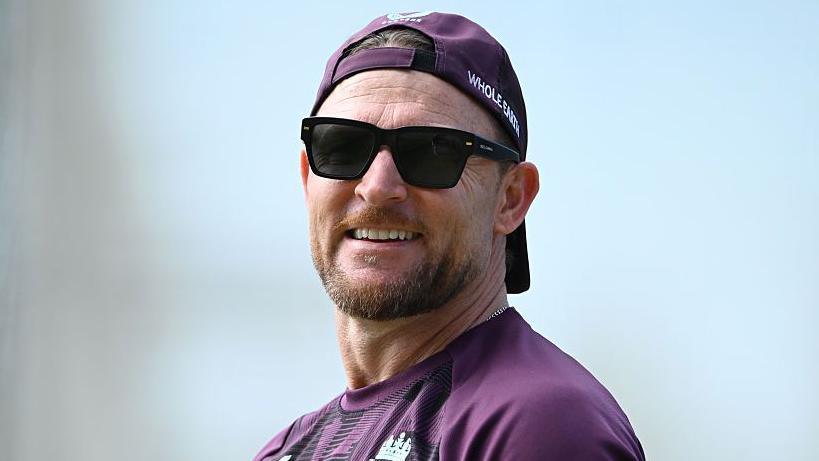
England have won 25 and lost 16 of their 43 Tests since Brendon McCullum took charge in 2022
Head coach Brendon McCullum said England are unlikely to make changes to their batting line-up for the crucial third Ashes Test in Adelaide, which begins on Wednesday.
England, 2-0 down after the first two Tests, must beat Australia at the Adelaide Oval to keep their hopes of regaining the Ashes alive.
Number three Ollie Pope and wicketkeeper Jamie Smith may have been candidates to be left out if England had considered making changes.
But asked if he anticipated fielding the usual top seven, McCullum said: "I would have thought so.
"We've been in positions where we have made some mistakes, and that can happen at times. But for us to go on and win this series, it's not about throwing out what has been successful for us over the last few years. It's about having more conviction.
"Knee-jerk reactions and chopping and changing settled batting line-ups is not really our way."
It is unusual for McCullum to address the media before a Test, and he explained his appearance on Sunday was because "we know where we are in the series".
In wide-ranging comments, McCullum:
left the door open for spinner Shoaib Bashir and seamer Josh Tongue to play in Adelaide
said any speculation that his job would be on the line if England lose this week "does not really bother me"
explained his previous comments about England being "overprepared" for their second-Test defeat in Brisbane
rejected any suggestion his team go about things in a "casual manner".
With changes to the top seven now seemingly off the table, England could opt to refresh their bowling line-up.
Conditions in Adelaide, including the high temperatures forecast when the Test begins on Wednesday (23:30 GMT on Tuesday), could necessitate the inclusion of specialist spinner Bashir.
'Noosa, Noosa, Noosa' - England's Ashes break ends
England airport incident with cameraman 'not ideal'
All-rounder Will Jacks was chosen ahead of Bashir in Brisbane, though captain Ben Stokes insisted Bashir remains England's first-choice spinner.
The 22-year-old was earmarked for this trip more than a year ago, but has not played a Test since July because of a broken finger and has figures of 2-266 from his two tour games in Australia.
Tongue would be the most likely candidate to come in if England want a new paceman, with Gus Atkinson possibly making way.
"We need to have a look at the conditions," McCullum told BBC Sport. "We have a squad of 16 here, which in a five-Test series, we know we will have to call upon the majority if not all of those.
"We will work out what we think is the best option to be successful in these conditions."
Heavy defeats on Ashes tours have often brought changes to England regimes.
This series was billed as a huge opportunity for England to win back the urn, yet the tourists are at risk of being out of the series at the earliest possible opportunity.
Though McCullum and Stokes are contracted to England until the end of the next home Ashes in 2027, their positions - along with that of director of cricket Rob Key - will come in for intense scrutiny if England are beaten in Adelaide.
Asked if a loss would put his job under pressure, McCullum said: "I don't know, but it doesn't really bother me, to be honest.
"I certainly don't coach to protect the job. I coach to get the best out of people and that's the same with the skipper. We both go about that in our same way with the same level of conviction and that won't be changing this week just because the prize is at its highest.
"I firmly believe that if we play our best cricket, we are a massive chance in this Test match. If we do that, then the narrative changes and the series momentum changes."
How much do you know about past Ashes games in Adelaide?
In the run-up to the second Test, England chose not to send players from the first Test to join a day-night England Lions game against a Prime Minister's XI in Canberra.
The tourists instead opted for five days of training in Brisbane which, in the aftermath of the Gabba defeat, McCullum claimed left them "overprepared".
On Sunday, the former New Zealand captain said he stood by his comments, but also explained he made them to draw attention away from the players.
"There's things that you say and things that you do - in the job you're in, sometimes it's better for the scrutiny to be on yourself," said McCullum.
"There is no perfect preparation. If there was and you could hit 4,000 balls to guarantee an average of 90, or bowl however many balls to guarantee 10 wickets, then we'll do it - don't worry. But that doesn't exist.
"Five intense days leading up to a Test match is not the best way to prepare. We'll be working out these next three days to make sure we get ourselves in the right frame of mind and skill level to be able to perform."
England returned to training on Sunday following a break in the Queensland resort town of Noosa.
Their approach has often attracted criticism, in particular their off-field activities during this tour.
On Sunday they began their training session with intense fielding drills, which have been uncommon for England under Stokes and McCullum.
"I do feel like there's a feeling that we go about our work in a very casual manner, but it couldn't be further from the truth," added McCullum.
"The level of intensity with which we try to operate with and the hard edge we try to bring to the team, is all encompassing. It's how we try to live our lives and set about this cricket team."

Police are searching for a gunman who shot dead two students and injured nine others at Brown University in Providence, Rhode Island.
Police say the attacker was a man dressed all in black who fled on foot, and a shelter-in-place warning is in effect for the area surrounding the prestigious university.
The attack on the campus brings the number of mass shootings in the US to 389 for this year, according to the independent analysis website Gun Violence Archive.
It defines mass shootings as having four or more victims killed or injured, not including the attacker.
Here's what we know:

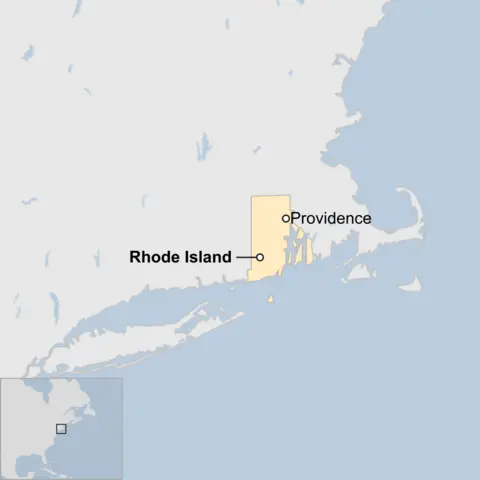
The gunman opened fire in a classroom at around 16:00 local time (21:00) on Saturday at the Holley engineering building at the eastern end of Brown's campus, according to officials.
Final exams were taking place in the building at the time of the shooting, the school said.
Barus and Holley engineering building is a seven-story block that includes 117 laboratories, dozens of classrooms and three lecture halls.
An economics professor told local public media outlet Ocean State Radio that the shooting had taken place during a review session for her course, which was led by her teaching assistant.
"He said that the shooter came in the doors, yelled something - he couldn't remember what he yelled - and started shooting," Rachel Friedberg said.
"Students started to scramble to try to get away from the shooter, trying to get lower down in the stadium seating, and people got shot," she added.
Two students studying in the nearby Rockefeller library when the active gunman alert came through told the BBC they "stayed away from the windows" as they awaited police escort.
Officers searched the floor, made them drop their bags and raise their hands before before being led out of the library, the pair said.
Brown University, one of the one of the oldest higher education institutions in the US, is part of the Ivy League, a group of elite universities in the northeast of the country.
The university, which has more than 11,000 students, is located in Providence, Rhode Island's capital city, located about 50 miles (80km) from Boston and 180 miles (290km) from New York City.
Two students were killed, and a further nine people are being treated. Medics say one person is in a critical condition, six are "critical but stable", and two others are less severely hurt.
The identities of those killed or injured have not yet been released, but Brown University President Christina Paxson told reporters in a press briefing that all the victims, including those killed and wounded, were students.
"This is a day that we hoped never would come to our community. It is deeply devastating for all of us," she said in a statement.
A ninth victim did not suffer a gunshot wound, according to police, who said they suffered non-life threatening injuries from fragments from the shooting "that had occurred near them".
Very little is known about the gunman so far, but police have released CCTV footage of a male suspect, walking away from the scene of the shooting wearing all black clothing.
There is no weapon visible in the video, and his face is covered. Officials also say a firearm was not found in a sweep of the building on Saturday.
Investigators do not yet know if the gunman was a student, but Providence Deputy Police Chief Tim O'Hara said the suspect was a male who was dressed all in black and appeared be in his 30s.
"We're utilising every resource possible to find this suspect," he said.
Some witnesses reportedly told officers he may have been wearing a camouflage grey mask.
One person was arrested before police determined they were not involved in the shooting and released them.
A massive operation involving police and federal agents is now underway in Providence as around 400 officers try to locate the suspect.
Residents and students near to the university have been told to stay at home and stay inside, or to stay away until the shelter-in-place is lifted.
Students in the area told the BBC they planned to stay at home until the things calm down and the gunman is caught.
US President Donald Trump, speaking to reporters as he returned to the White House from attending the annual Army and Navy football game, described the shooting as "a terrible thing".
"All we can do right now is pray for the victims and for those that were very badly hurt," he said.
Additional reporting by Pratiksha Ghildial
曾是香港立法会第一大党的民主党星期天宣布解散,即日起结束运作。
“香港01”报道,民主党星期天(12月14日)召开特别会员大会,议决解散清盘。
党主席罗健熙在会后向媒体透露,表决清盘时共有121人投票,117票赞成,没有反对,但有四票白票,支持率约97%。
罗健熙称,民主党怀着不舍心情做解散决定,尽量在一年完成清盘。清盘完成后,若有剩余资产,会捐给工业伤亡权益会。至于用作总部的商业大厦单位已找到买家,会在年底前交吉,料12月31日前清场。
民主党在1994年由港同盟与汇点合并而成,曾是香港立法会第一大党。2019年该党积极参与反修例运动,罗健熙被控非法集结罪,不过被法院裁定无罪。
罗建熙表示,解散的艰难决定,考虑了很多因素。创党元老、民主党前主席杨森则表示,解散是受到政治压力和政治环境影响。
据路透社报道,多名民主党资深党员说,他们曾被中国大陆官员或中间人接触,并被警告若不解散,将面临严重后果,包括可能遭到逮捕。
今年2月,民主党宣布启动解散程序,4月召开特别会员大会,正式通过授权中央委员会跟进解散事宜。
罗健熙星期天表示,民主党对香港的关切和热爱始终如一,愿香港市民珍重。
广东省政府拟出台规定,要求收取茶位费、服务费等附加费用的餐饮业者,必须在顾客点餐前明确告知,并公示收费标准。
广东盛行早茶文化,餐馆对每个就餐顾客收取茶位费这一约定俗成的现象,经常引起外地游客争拗,有人称其“消费陷阱”,即使不喝茶也被收取茶位费,或者“只管收钱、不管服务”等。
广东省市场监督管理局近日在官网发布涉及餐饮行业、商品零售行业和住宿业的三份行为指引意见稿,向社会公开征求意见,意见反馈截止日期为本月24日。
其中,《广东省餐饮行业“诚信价格”行为指引(征求意见稿)》明确,若收取服务费、茶位费等附加费用,需在消费者点餐前明确告知并公示收费标准。
商品说明方面,经营者不仅应标明菜品名称和价格,还需标示主要食材。因食材规格、产地、等级等特征不同而实行不同价格的,经营者应当针对不同的价格分别标示,以示区别。进口食材需标注产地。
香港星岛头条报道,对于有消费者吐槽,曾遇到团购套餐比单点价格更高的“套路”,意见稿规定,套餐优惠需列明包含的菜品及单价(套餐价格应等于或低于相应各菜品价格之和),套餐价还要明确包含的菜品及分量。
意见稿提出,平台经营者不得侵犯经营者自主定价权利,或利用技术手段等强制经营者进行虚假的或者使人误解的价格标示。
平台经营者也不得强制或者变相强制平台内经营者按照其定价规则,以低于成本的价格提供餐饮,扰乱市场竞争秩序。

© Saeed Khan/Agence France-Presse — Getty Images